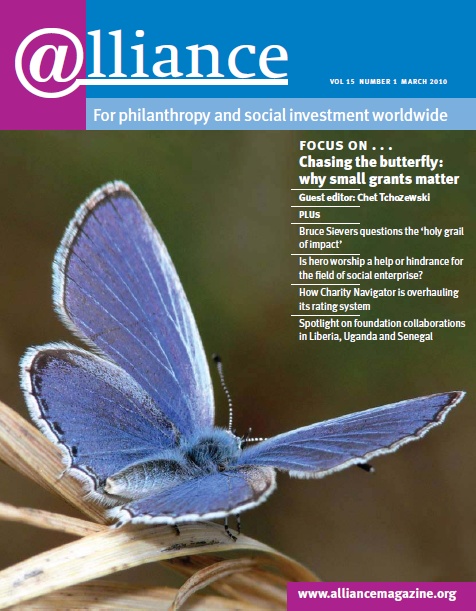When the Joseph Rowntree Charitable Trust more than doubled in size in 1988 following the takeover of the Rowntree Company by Nestlé, an interesting debate took place within the trust over whether it should split into two. A key issue was whether the trustees were comfortable with the greater power increased wealth would bring. Twenty years on, it is hard to believe that the debate happened. The trustees quickly grew used to their increased spending power. This has inevitably led to some changes in the way we operate, but it hasn’t altered our fundamental aim: to be an adventurous and responsive grantmaker supporting social change. And we often find the best way to do this is through small grants.
One of the changes is that we have taken more initiatives ourselves, either because we feel we are best placed to do so or out of frustration that others are not approaching us for things that we can see need doing. A second change is that we make more larger grants and for longer periods – which is often the right approach if you can do it.
But our underlying ethos is still that we want to be a responsive grantmaker, willing to take risks and be adventurous in supporting individuals and organizations working creatively to promote a more just and peaceful society – and we do this largely through small grants. In 2008, we made two grants of over £300,000, but 75 per cent of grants were for less than £50,000, and many of these were multi-annual awards accounted for in year one.
Here are three reasons why making small grants is important.
Experimenting with different options
We tend to stick with our main programmes for a long time, but within these we often use small grants to test where the priorities should be moving and experiment with different ideas. It is much easier to take risks with small grants. We can support and empower people without having to be too concerned about the outcome. Our experience is that adventurous funding rarely disappoints. Some of our small grants have resulted in profound change.
The Citizens Ethics Network, led by journalist Madeleine Bunting and Adam Lent of the Trades Union Congress, is planning to promote a debate on ethics in the public sphere during the forthcoming UK election campaign. This isn’t central to any of our grants programmes, but it is central to our mission. What they needed was a small amount of unrestricted money to launch a compilation of essays and organize a public meeting. The Barrow Cadbury Trust and JRCT responded and the project was away.
Promoting organic and sustainable development
Mae West said that too much of a good thing can be wonderful. But it can also be disastrous. We are keen to reach out to communities where there might be little infrastructure or experience of running organizations. Here, moving at the right pace is often the key to long-term success. We are also keen to help incubate new thinking, and to stand alongside organizations as they develop. This takes time and a skilled and sophisticated approach to funding.
In 2003, we identified building political participation as a growing priority. We experimented with several initiatives before Richard Wilson approached JRCT for a small grant to map the participation field. When he came back with the idea of creating an organization specializing in the area, we offered him a slightly larger grant. Four years later, Involve has a staff of ten and a budget of £470,000.
Being open to new thinking
A great strength of our sector is the ability to respond quickly to emerging issues, where at the outset what is needed is a small amount, quickly offered, to take a particular action. We had become aware of deep concerns among Muslim organizations about the government’s counter-terrorism strategy and the way the Preventing Violent Extremism programme was being implemented. A climate of fear was preventing any expression of these concerns. The Institute of Race Relations decided to organize a seminar in West Yorkshire to inform a report on the problem. A grant of £2,800 enabled this to happen. The report helped impress on public and policy-making opinion that a programme aimed at winning the trust of Muslims in Britain might have exactly the opposite effect.
Of course there are drawbacks to making many small grants: their administration can be disproportionately time-consuming, and often the most effective way of supporting social change is to offer long-term core support to key organizations addressing issues of social injustice. But in any strategy for creating change, making small grants to foster creative ideas and shift the debate is an important tool.
Stephen Pittam is secretary of the Joseph Rowntree Charitable Trust. Email stephen.pittam@jrct.org.uk






Comments (0)